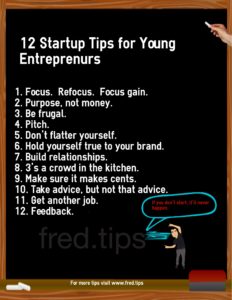Success, at this point in your life is defined as setting the table and building for the future. This is not the time to enjoy the feast. Understand that this isn’t your time to “practice” or use it as a “dress rehearsal” – this is the real thing! Use this time to explore, refine, find passion, find purpose, find talents, and lastly, learn to serve the greater good. Bring value to people and people will invest in your talents.

1. Invest in your friendships.
No, don’t give all your friends money and call it a day. Spend the time to figure out who you can count on and who is always there for you. Find the group who cares about your goals, your ambitions, your dreams, and hang out with those guys. Invest in the growth of your friendship with this group of people. The benefits are endless in the long-run.
2. Happy Birthday.
Two words, they come around once a year. Write down all of the birthdays of the people closest to you in your calendar. When the day comes, call, text, email, send a dancing telegram, anything… Why does this matter? There is value in being the person who always remembers birthdays and anniversaries. It takes nothing from you to remember, but means the world to the person you remember for. Do the little things.
3. Time.
Stop thinking of time as a limitless commodity. Find your urgency. You don’t have unlimited time to “figure it out” or “get to it soon” – the clock is ticking on you. So many young professionals feel they have forever and a day to put it all together; when they get there, if they get there, they’ll figure it out. You need to shift that and start trying to figure it out now and plan how to get there sooner than later.
4. You have talent!
You have a gift. Think about what things you do better than anyone else. It could be time management, it could be motivation, it could be your diet… anything! Think about how that talent can serve people. Start planning to build your empire around that talent.
5. Stop the texts.
Business opportunities are conducted over the phone. Stop hiding behind your text messages. Have something to say? Call that person. There is no value in driving up your text message counter when you can simply call someone and resolve a problem. Stop being a sissy and pickup the phone. You’ll thank me later.
6. Nice job! Stop sitting around.
Someone took a gamble and gave you a job. The absolute worst thing you can do is sit around and wait to be told what to do. These people invested in you and gave you an opportunity. Firstly, be so grateful that you don’t even think about wasting their money. Have nothing to do? Find ways to bring value to the company. Research something, read the website for spelling errors, compile marketing information, do something OTHER than sit there! The approach should be to do too much and not too little.
7. Upgrade your resume content.
Let me guess, you are proficient in Word, Excel, and Power point…. who cares! Everyone is proficient in Microsoft Office Suites. What is going to set you apart from the 30 other resumes you are competing against? Think about becoming proficient in these categories to start separating you from your competition: HTML, iOS, Google Adwords, CSS, WordPress, Adobe Illustrator, Adobe Photoshop, etc.
8. Relationships.
No, not your sweetheart. Learn how to build relationships with different types of people. Contrary to popular belief, your skill set and a polished resume will only take you so far. You need relationships to push you to the next level. If you can’t talk to people, if you can’t SELL to people, you can’t be successful.
9. Be smart with your money.
I know how attractive that Euro-trip looks right now. Don’t spend the last $11,000 you have saved up to go to Europe for a few weeks then come back broke as a joke. Same goes to the next 11 weekends where you spend $1,000 to “live it up with your friends”. Work for your future, not for this weekend.
10. Investments.
Don’t know how to invest? Don’t worry. Nobody else does either. The one thing about investments that everyone can agree on is to start. Even if that means you put $50 a month into an interest earning account. The magic of compounding interest will keep earning you money as you get older. Every financial advisor will agree that the sooner you invest, the better off you will be. Find a dollar amount you like, and start. START.
11. Friends.
Ever hear “you are the average of the 5 people you spend the most time with” – now look around… What do those 5 friends look like? Are you comfortable being the average of that group? All those friends you swore you would never lose touch with… well, you will! I won’t go into too much detail on this, but if you need to divorce some of those friends, read THIS.
12. Get out of the cubicle life.
Get out as soon as possible. I get it, it’s a job and it pays the bills. Fine. Work in a cubicle. Now, find a way to get out as soon as you can. Chances are, if you are working in a cubicle, you don’t have a plan for life. The other chance is that you are stealing money from the person who gave you an opportunity to work for them.
13. Great ideas mean nothing… yet.
Everyone has ideas. People sit around, come up with ideas, dream about the money it would bring them… then wake up at 8am and go back to work. The key to these ideas is execution and determination. The get rich quick schemes have all been discovered and are now obsolete. The trick is to take your idea, and plan out the entire life cycle of this business. The key question might be: Is this something I’m willing to invest the next 10 years of my life for?
14. Debt.
Find ways to eliminate it. I know, your initial thought is I need to make more money to pay off debt. That is what our minds are programmed to think. Your true thought should be to cut spending to pay off more of my debt. You need to eliminate as much of this debt as possible so you can start planning to afford things like a home or a nice car. Debt is so powerful it will end up stressing you to sleep every single night until its gone.
15. Mentors.
Emulation is the sincerest form of flattery. Find someone who is willing to give you free advice and guidance. Word of caution: Don’t start sending messages to everyone on Facebook asking for them to become your mentor. Find ways to provide value in the lives of the people you want help from and you’ll be shocked at how much they are willing to give back. The trick is to find ways to provide value. TIP: Don’t send them a message asking how you can provide value. Do your own homework.
Remember, these are all recommendations to make the next stage in your life a little better. Take all this with a grain of salt and adjust it to fit your lifestyle. Remember, not to take life too seriously. Nobody gets out alive.
Related Posts:
7 Reasons to Divorce Your Loser Friends
6 Reasons Why You Lack Motivation
7 Tips to Crushing Your Goals














